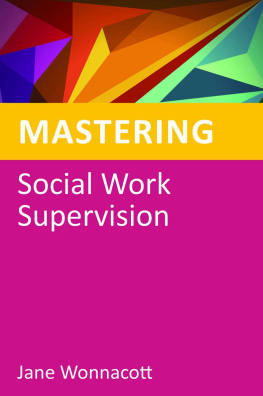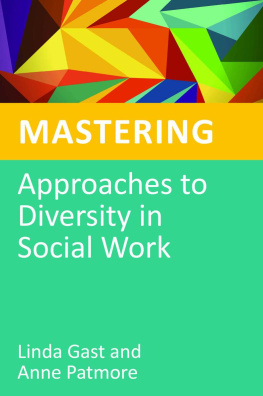Mastering Social Work Supervision
Mastering Social Work Skills series
Edited by Jane Wonnacott
This series of short, accessible books focuses on the everyday key skills that social workers need in order to practise effectively and ensure the best possible outcomes for service users. Easy to read and practical, the books feature key learning points, practice examples based on real-life situations, and exercises for the reader to enhance their learning. The books in this series are essential reading for post-qualifying social work students and social work practitioners.
Jane Wonnacott is Director of In-Trac Training and Consultancy, UK.
other books in the series
Mastering Approaches to Diversity in Social Work
Linda Gast and Anne Patmore
ISBN 978 1 84905 224 5
MASTERING
Social Work
Supervision
Jane Wonnacott
Jessica Kingsley Publishers
London and Philadelphia
The Decision Tree reproduced by permission of SAGE Publications, London, Los Angeles, New Delhi and Singapore, from Effective Child Protection (2008) 2nd Edition, by Eileen Munro.
First published in 2012
by Jessica Kingsley Publishers
116 Pentonville Road
London N1 9JB, UK
and
400 Market Street, Suite 400
Philadelphia, PA 19106, USA
www.jkp.com
Copyright Jane Wonnacott 2012
All rights reserved. No part of this publication may be reproduced in any material form (including photocopying or storing it in any medium by electronic means and whether or not transiently or incidentally to some other use of this publication) without the written permission of the copyright owner except in accordance with the provisions of the Copyright, Designs and Patents Act 1988 or under the terms of a licence issued by the Copyright Licensing Agency Ltd, Saffron House, 610 Kirby Street, London EC1N 8TS. Applications for the copyright owners written permission to reproduce any part of this publication should be addressed to the publisher.
Warning: The doing of an unauthorised act in relation to a copyright work may result in both a civil claim for damages and criminal prosecution.
Library of Congress Cataloging in Publication Data
A CIP catalog record for this book is available from the Library of Congress
British Library Cataloguing in Publication Data
A CIP catalogue record for this book is available from the British Library
ISBN 978 1 84905 177 4
eISBN 978 0 85700 403 1
CONTENTS
Figures and Tables
Consequences of poor relationship within supervision
The 4 x 4 x 4 model
The supervision cycle
Quick fix supervision
Exploration of knowledge and skills in supervision
An adapted 4 x 4 x 4 model
Four styles of parenting
Possible outcomes of the four styles of supervision
Staying in the authoritative zone
The ball of stress
The red and green cycles
The compromised assessment
The emotional intelligence paradigm and authoritative supervision
Supervision at the interface
Supervision the six-stage model
Role, identity and self
The discrepancy matrix
Interaction between social worker and service user
Ecomap for Nina
Decision tree
The performance improvement continuum
Managing performance through practice leadership
Factors affecting practice performance
Latent Error Path
The competence matrix
Unconscious competence
The set-up-to-fail syndrome
The blocked worker
A comprehensive model of change
Building commitment to change dissatisfaction and security
A new supervisors journey
The process of action learning
What do supervisors need?
Functions of supervision described in supervision literature
Outstanding qualities in leaders and supervisors
Exercise to establish supervision history
The four functions of supervision
Formal and informal supervision
Game theory and supervision
Stress mapping
The atomistic versus the holistic approach to assessment
Critical thinking and reflective judgement (adapted from King and Kitchener, 1994)
Framework for initial analysis of early performance concerns
Example of completed framework for analysis of early performance concerns
Potential causes of weak performance
Understanding the functions of blocked behaviour
Strategies linked to blocked behaviour
Supervisee feedback questionnaire
Series Editor Foreword
When social workers have confidence in their own skills, purpose and identity, and in the system in place to back them up, they have a huge amount to offer. They collaborate effectively with other professionals and adapt to new roles and expectations. Most importantly, they forge constructive partnerships with people who find themselves vulnerable or at risk and make a sustained difference in their lives.
Report of the Social Work Task Force (2009, p.5)
This book forms part of a series which aims to increase social work confidence by exploring the essential skills that social workers need to do their job and giving accessible, practical ideas based on evidence from research and practice.
The series challenges the view that social work is about doing the simple things well, a view that has taken hold in some circles since publication of the Laming report in 2003. Social work is not simple; it is a complex activity, and social workers are working with risk and uncertainty on a day-to-day basis.
It is the premise of this series that good social work involves the capacity to develop and maintain relationships, manage the emotional dimension of the work and make judgements and decisions, often in the light of conflicting information. This is demanding work and will only be effective if social workers are encouraged to reflect critically on their practice and to continue developing their knowledge and skills. Too often the time for reflection and skill development is minimal, and social workers rely on prescriptive procedures that do not always assist the creativity and critical thinking that are fundamental to good, safe practice.
The starting point for authors of this series is a positive expectations model, that is, one based on the assumption that social workers want to do a good job and need flexible tools and frameworks to help them practise in the challenging environment within which they work. The authors are experienced social work trainers and practitioners and the content of each book is based on material that has been extensively tested with front-line practitioners and their managers.
A comment on the title
The series has been entitled Mastering Social Work because it aims to move beyond basic skills to those which may support the practitioner in more challenging circumstances. Mastering is a process of developing expertise by applying learning and knowledge to practice. It is a continuous activity. Our aim and hope is that this series will assist social workers in this task by providing ideas and frameworks to support them in their day-to-day work.
Mastering is a gendered term. We have thought carefully about its use in a social work context and have searched for alternatives but there are no others that convey its intended meaning here a process of developing exceptional skill.






